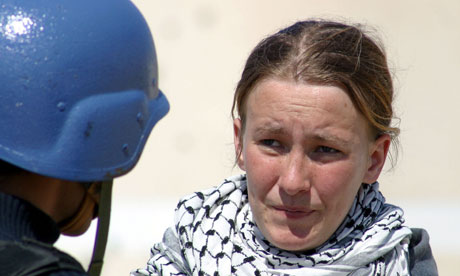
The case, which began in March, reopened at Haifa district court today and will hear Israeli state witness testimony on her death. The 23-year-old had been trying to prevent the demolition of a Palestinian house in Rafah, in the Gaza strip.
In 2003 an Israeli army investigation into the incident concluded that its troops were not to blame for Corrie's death. Her family says that a full investigation was never carried out.
Representing the Corrie family, Hussein Abu Hussein, a leading human rights lawyer in Israel, said: "It is clear that the army investigation was very far from being sufficient, thorough or impartial."
Today the court heard from one of the military investigators into the case, referred to only by his first name, Oded. He told the court that he did not think it important during the investigation to question Palestinian eyewitnesses to the incident, or the medical team that treated Corrie. Abu Hussein said: "It is amazing that this 20-year-old – at that time with no legal background and no experience – was responsible for this investigation."
The court was also shown about 12 minutes of Israeli footage from surveillance cameras close to where the incident took place. Hussein said the clip started minutes after the incident, although the cameras it came from are supposed to operate around the clock.
Rachel's father, Craig, said: "Being here is emotionally taxing in ways that are really hard to explain, but we have to do it and have an obligation to the many who cannot. It is not just about Rachel or our family."
The state will present as witnesses the head of the military investigation and the men who were operating the bulldozer that killed Corrie.
Corrie, from Washington, travelled to Gaza during a period of intense conflict between the Israeli military and the Palestinians. Her diaries, in which she describes her experiences in Gaza, were later turned into a play, My Name is Rachel Corrie, which has toured internationally.







